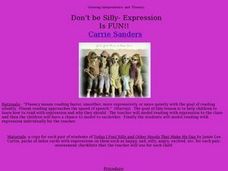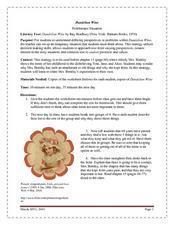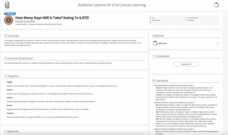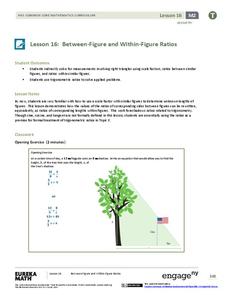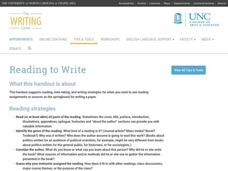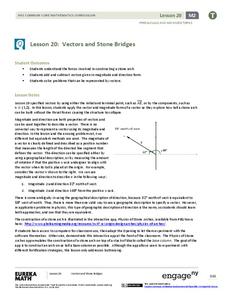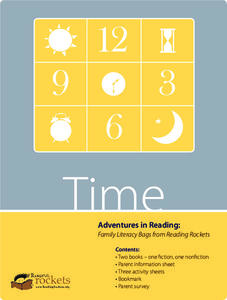Curated OER
Strategies for Success
Students share opinions about common bad habits, read about behavior economics by reading and discussing article "Your Plate Is Bigger Than Your Stomach," identify goals and strategies designed to improve negative behaviors, and test...
Curated OER
Don't Be Silly–Expression is Fun!
As children observe the teacher reading Today I Feel Silly and Other Moods That Make My Day, they take note of the role punctuation plays in the emotion or expression used. They then take turns reading a book with a partner so they can...
Missouri Department of Elementary
What Are Bullying and Harassment? Part 2
After reviewing notes from the previous lessons, small groups obtain a scenario card that describes a situation in which bullying is happening. Peers discuss the event and brainstorm two solutions using the STAR method then present their...
Curated OER
Year 6: Word Problems
Engage your critical thinkers with a series of word problems that ask them to discuss their problem solving strategies. There are eight multi-step problems to solve, each problem includes the notes on the operation performed, the process...
Curated OER
Dandelion Wine: Problematic Situation
If forced to move and give away almost everything you own, what five non-essential things would you take with you? Prior to reading about Mrs. Bentley in chapter 15 of Dandelion Wine, individuals are asked to respond to this problematic...
K20 LEARN
How Many Days Will It Take? Eating To 6,972!: Partial Quotients
The story, How Many Jelly Beans? by Andrea Menotti introduces a lesson about partial quotients. Mathematicians practice rounding and multiplying, then work in small groups to connect those skills with division and partial quotients....
National Security Agency
Partying with Proportions and Percents
Examine ratios and proportions in several real-world scenarios. Children will calculate unit rates, work with proportions and percentages as they plan a party, purchase produce, and take a tally. This lesson plan recommends five...
EngageNY
Between-Figure and Within-Figure Ratios
Tie the unit together and see concepts click in your young mathematicians' minds. Scholars apply the properties of similar triangles to find heights of objects. They concentrate on the proportions built with known measures and solve to...
Positively Autism
"When I Feel Angry" Social Skill Story
Here's a presentation that shows kids appropriate ways to behave when they are feeling angry. They learn how to identify when they are feeling angry, calming strategies they can use, and words they can use to express their anger. The...
Curated OER
Modals
Verbs can be tricky, especially those modal verbs of probability. Take a look at a wonderful 16-page workbook that uses think-pair-share, critical thinking, skills practice, and discussion to assist learners in using the correct modal...
MENSA Education & Research Foundation
I Need a Superhero
Once the class learns about the hero's journey, they'll find it in every story and movie they see! Take characters from their humble beginnings to their atonement and apotheosis with a set of lessons about the hero's journey focusing...
Manchester College
Spain – Culture and Famous Landmarks
Introduce your class to Spain and liven up the class period with some Spanish pop music! Learners view a presentation about Spain and take notes on the information before watching a couple of music videos in Spanish. They use listening...
Nebraska Department of Education
Stereotypes
Stereotyping leads to prejudice. That's the central concept in a lesson designed for eighth graders. After identifying the traits associated with different stereotypes, class members brainstorm actions they can take to stop stereotyping.
University of North Carolina
Reading to Write
Silly journal and essay prompts may be fun to write, but they don't model the kind of writing needed for college papers and standardized tests. The 15th part in a series of 24 covers the concept of reading to write—during and after...
California Education Partners
Telescopes
An assessment challenges scholars to read an informative text then respond with an explanatory essay. The exam begins as participants read a text passage twice then take notes, making sure to jot down key details. Following the...
Novelinks
The Giver: Reading Road Map
Sometimes it's helpful to read certain passages in a novel slowly and carefully, and to read other parts more quickly to move the plot along. Learners tread carefully through Chapter 20 of Lois Lowry's The Giver, noting which parts need...
K12 Reader
Making Predictions
Prediction as a reading comprehension strategy is the focus of an article attached to a two-part worksheet. Kids read the article and then use the provided information to respond to the comprehension questions.
Daughters of the American Revolution
Lesson 1: How Do Society’s Expectations Influence Education?
The history of women's education can be traced back to the delicate stitching of student samplers from the 19th century. Modern-day pupils examine and analyze four primary sources, three of which are images of embroidered samplers, which...
Curated OER
Finding Solutions by Working Backwards
In this math activity, students learn to solve word problems by working backwards. Students read the 20 word problems and solve them, choosing the best answer from 4 choices. There are helpful hints on the page to clue students to work...
Workforce Solutions
The Negotiations of Interviewing
Sometimes the interview process includes negotiating for what you want. Here's an activity that guides job seekers to achieve The Best Alternative to a Negotiated Agreement (BATNA). Participants take on the role of job seekers and...
EngageNY
Vectors and Stone Bridges
What does it take to build a stable arch? Pupils apply vectors and physics as they examine arched bridges and their structural integrity. They use vectors to represent the forces acting on the stone sections and make conclusions based on...
Curriculum Corner
Academic Math Vocabulary
The ABCs of math are so important. Find commonly used math terms in a 42-page packet. Each page has the word, a place to write the definition, and a place to give specific examples of the term. A must-have for all math classrooms!
PBS
Reading Adventure Pack: Time
An activity packet explores the concept of time. First, scholars read two stories—The Very Grouchy Ladybug by Eric Carle and Telling Time: How to Tell Time on Digital and Analog Clocks! by Jules Older, illustrated by Megan Halsey....
PBS
Reading Adventure Pack: The Snowy Day
Scholars listen to a read-aloud of fiction and nonfiction books, The Snowy Day, written and illustrated by Ezra Jack Keats, and Snow Is Falling, written by Franklyn Branley and illustrated by Holly Keller, then take part in four creative...



